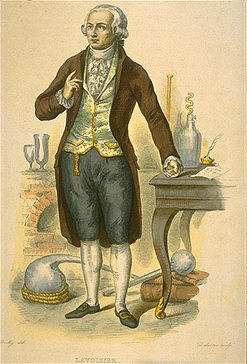It happened today - May 8, 2016
 Speaking of the French revolution, today is the day they cut off chemist Antoine Lavoisier’s head, on May 8 1794, for putting water in the tobacco or something. He hadn’t. But the French revolution wasn’t hung up, or chopped off, on that sort of technicality. He was tried, convicted and guillotined on the same day. And two years later another regime sent his widow a note saying sorry.
Speaking of the French revolution, today is the day they cut off chemist Antoine Lavoisier’s head, on May 8 1794, for putting water in the tobacco or something. He hadn’t. But the French revolution wasn’t hung up, or chopped off, on that sort of technicality. He was tried, convicted and guillotined on the same day. And two years later another regime sent his widow a note saying sorry.
Now Lavoisier seems to have been an excellent chemist and a brilliant self-promoter. He is widely considered the “father of modern chemistry” although he drew rather heavily on the work of others. But there’s no real question that he was instrumental in changing chemistry into a mathematically precise science. (Regular readers will know that I am on the whole opposed to the quantification of things. But I don’t object to it in sciences where it works, definitely including chemistry. What I mind is thinking that chemistry is the model for all knowledge and trying to quantify history or sociology.)
Lavoisier helped create the metric system, which I do consider bad. But he wrote the first thorough list of chemical elements, predicted silicon, showed sulphur was an element not a compound, helped get rid of phlogiston and so on. A lot of good things, none of which you’d probably be inclined to kill a man for.
He was also an important aristocrat, which was the sort of thing they killed you for in France in 1794. Worse, he had taken part in the rightly loathed “Ferme générale,” a lawless system of farming out tax collection that encouraged rapaciousness. And he did profit from his place in the ancien régime to support his studies and his lifestyle. On the other hand, he was an efficient public servant, especially by the standards of France in his day. As a member of the Gunpowder Commission he dramatically improved the quality and profitability of its manufacture and, being something of a “chancer” as the British put it, also bagged a house and laboratory in the Royal Arsenal.
Moreover, as an enlightened 18th-century-style liberal, he was trying to reform the system from within, putting forward proposals to reform taxation, monetary policy and education in the interest of the common people. He was quite mistaken about the ability or desire of “enlightened” despots to adopt good ideas, though very right to fear the violence that might erupt if sensible reforms were not undertaken. And indeed he was caught up in the “deluge” predicted by Louis XV, not least because the Ferme Générale was so rightly hated. But also because the revolution like Saturn devoured even its own children and certainly everyone else; all France’s learned societies were suppressed on August 8 1793 in a singularly virulent outbreak of the notion that all you need is political will. And he was executed along with 27 codefendants on May 8 of the next year.
Clearly the charges were trumped up, at least in his case, from plundering the people and treasury to funding France’s enemies to the business about tobacco, I presume fraudulently to increase its weight. He was posthumously exonerated and his name is now inscribed on the Eiffel Tower. Whereas phlogiston has not been rehabilitated.
An important lesson here is that in politics it is far easier to acquire the vices of our adversaries than their virtues. Lavoisier is exactly the sort of man the monarchy should have listened to and the revolution should have cherished. And exactly the sort of man neither would have and neither did.